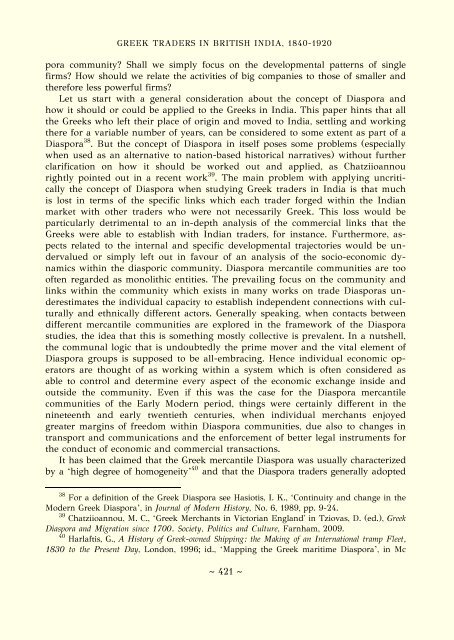Create successful ePaper yourself
Turn your PDF publications into a flip-book with our unique Google optimized e-Paper software.
GREEK TRADERS IN BRITISH INDIA, 1840-1920<br />
pora community? Shall we simply focus on the developmental patterns of single<br />
firms? How should we relate the activities of big companies to those of smaller and<br />
therefore less powerful firms?<br />
Let us start with a general consideration about the concept of Diaspora and<br />
how it should or could be applied to the Greeks in India. This paper hints that all<br />
the Greeks who left their place of origin and moved to India, settling and working<br />
there for a variable number of years, can be considered to some extent as part of a<br />
Diaspora 38 . But the concept of Diaspora in itself poses some problems (especially<br />
when used as an alternative to nation-based historical narratives) without further<br />
clarification on how it should be worked out and applied, as Chatziioannou<br />
rightly pointed out in a recent work 39 . The main problem with applying uncritically<br />
the concept of Diaspora when studying Greek traders in India is that much<br />
is lost in terms of the specific links which each trader forged within the Indian<br />
market with other traders who were not necessarily Greek. This loss would be<br />
particularly detrimental to an in-depth analysis of the commercial links that the<br />
Greeks were able to establish with Indian traders, for instance. Furthermore, aspects<br />
related to the internal and specific developmental trajectories would be undervalued<br />
or simply left out in favour of an analysis of the socio-economic dynamics<br />
within the diasporic community. Diaspora mercantile communities are too<br />
often regarded as monolithic entities. The prevailing focus on the community and<br />
links within the community which exists in many works on trade Diasporas underestimates<br />
the individual capacity to establish independent connections with culturally<br />
and ethnically different actors. Generally speaking, when contacts between<br />
different mercantile communities are explored in the framework of the Diaspora<br />
studies, the idea that this is something mostly collective is prevalent. In a nutshell,<br />
the communal logic that is undoubtedly the prime mover and the vital element of<br />
Diaspora groups is supposed to be all-embracing. Hence individual economic operators<br />
are thought of as working within a system which is often considered as<br />
able to control and determine every aspect of the economic exchange inside and<br />
outside the community. Even if this was the case for the Diaspora mercantile<br />
communities of the Early Modern period, things were certainly different in the<br />
nineteenth and early twentieth centuries, when individual merchants enjoyed<br />
greater margins of freedom within Diaspora communities, due also to changes in<br />
transport and communications and the enforcement of better legal instruments for<br />
the conduct of economic and commercial transactions.<br />
It has been claimed that the Greek mercantile Diaspora was usually characterized<br />
by a ‘high degree of homogeneity’ 40 and that the Diaspora traders generally adopted<br />
38 For a definition of the Greek Diaspora see Hasiotis, I. K., ‘Continuity and change in the<br />
Modern Greek Diaspora’, in Journal of Modern History, No. 6, 1989, pp. 9-24.<br />
39 Chatziioannou, M. C., ‘Greek Merchants in Victorian England' in Tziovas, D. (ed.), Greek<br />
Diaspora and Migration since 1700. Society, Politics and Culture, Farnham, 2009.<br />
40 Harlaftis, G., A History of Greek-owned Shipping: the Making of an International tramp Fleet,<br />
1830 to the Present Day, London, 1996; id., ‘Mapping the Greek maritime Diaspora’, in Mc<br />
~ 421 ~



